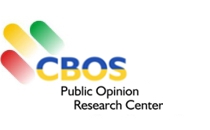| LATESTPUBLICATIONS Polish Public Opinion February 2023
 | War in Ukraine and the international reaction
|
 | Inflation and public finances
|
 | COVID-19 and flu: which is the bigger threat
|
 | Activities and experiences of Poles in 2022
|
"Opinions and Diagnoses"no 48
Young Poles in CBOS Surveys 1989–2021
no 49
Youth 2021
no 50
Secularisation in Poland
Reports | Trust in Politicians in February
|
 | Attitude to Government in February
|
 | Moods on the Job Market in March
|
 | Opinions about Wind Energy
|
 | Poles on the War in Ukraine One Year after Its Outbreak
|
 | Trust in Politicians in March
|
 | Attitude to Government in March
|
 | Poles on the Amendment of Electoral Code and Voting Facilities
|
 | Assessment of Joe Biden's Visit to Poland and Ukraine, Perception of Polish-American Relations and U.S. Influence on the World
|
 | Social Moods in March
|
 | Opinions about Public Institutions in March
|
|
|
How Quickly Should Poland Become Climate Neutral?
| The war in Ukraine and its effect on the energy sector has had an impact on Polish thinking about energy transition and the achievement of EU climate targets.
| In accordance with the objectives of the European Green Deal, the European Union should be climate neutral by 2050. In 2021 achieving this goal in respect of Poland had the support of almost half of those surveyed (48%, including the 27% who said this should happen even earlier). Now, however, the goal of achieving climate neutrality by 2050 is supported by significantly fewer people (38%, with 21% wanting it to happen sooner). Over a half (55%, which is 12 points higher than almost two years ago) currently believe that Poland should achieve climate neutrality at its own pace, even if that means reaching the target after 2050.
| |
| More on this subject in the CBOS report.
| This ‘Current Events and Problems’ survey (394) was conducted using a mixed-mode procedure on a representative sample of named adult residents of Poland, randomly selected from the National Identity Number (PESEL) register. Respondents independently selected one of the following methods: Computer Assisted Personal Interview (CAPI); Computer Assisted Telephone Interview (CATI), respondents receiving researchers’ telephone numbers in an introductory letter from CBOS; Computer Assisted Web Interview (CAWI), where respondents filled in the online questionnaire independently, gaining access by means of a login and password provided in an introductory letter from CBOS. In all three cases the questionnaire had the same structure and comprised the same questions. The survey was carried out between 6–19 February 2023 inclusive on a sample of 982 people (58.4% using the CAPI method, 25.9% CATI and 15.7% CAWI). CBOS has been conducting statutory research using the above procedure since May 2020, stating in each case the percentage of personal, telephone and internet interviews.
|
|



